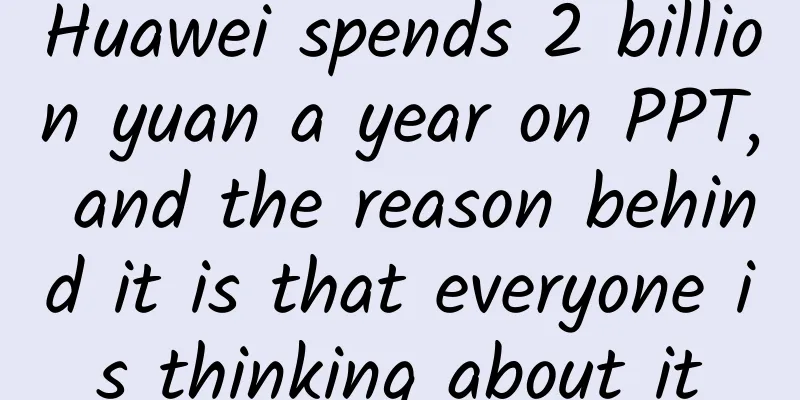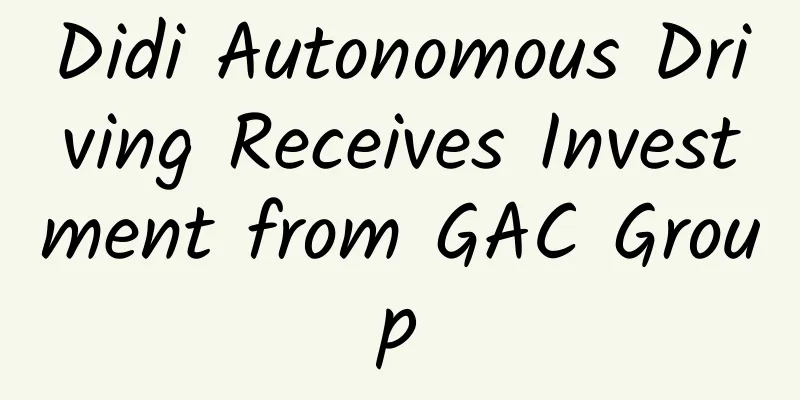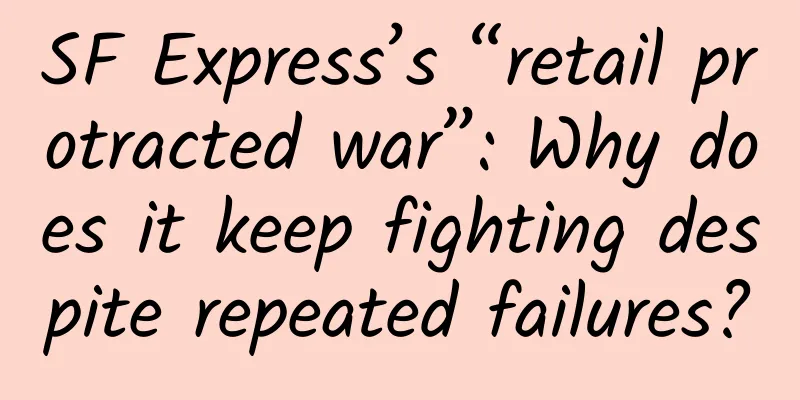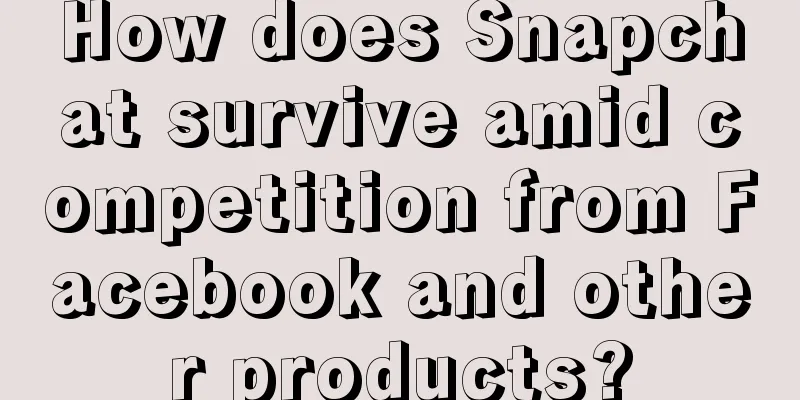Huawei spends 2 billion yuan a year on PPT, and the reason behind it is that everyone is thinking about it

|
Recently, a Huawei employee complained that he had more than 6,000 sets of films stored in his computer. Someone calculated that the labor cost of each set of films was as high as 60,000 yuan (some people said it was not expensive!). Congratulations to this guy, you accidentally own 360 million yuan in assets. Some people even calculated this data: Assuming that Huawei has 80,000 people who need to write 12 films every year, each of which takes 30 hours, and each of which involves 8 people (including reviewers), with an average annual salary of 600,000 yuan, Huawei spends 2 billion yuan on films every year (I almost fell off the small stool when I saw this number!). (2 billion! Who should I ask for it?) No wonder some employees jokingly call Huawei the "Huawei Film Company". No one in Huawei can explain why PPT is called film. The transparent plastic sheets that were once used for projection have long fallen into the dust of history, but the PPT that replaced it is popular in Huawei, but it is still called "film". In Huawei, what work requires writing films? Weekly reports, biweekly reports, monthly reports, monthly reports, temporary reports, progress of key work, various job reports, and of course customer documents. Who should I write for and who should I tell? Just list them, PDT, SPDT, BMT, IPMT, HRC, ESC, SDC, FC, ESC, even the board of directors, rotating CEO, and even the boss. "What is the main business of your department?" "Writing slides (Microsoft laughed!)." Even exaggerated, in a team of 10, there are often 4 people responsible for writing slides from beginning to end of the year. Slides (PPT) are just a tool, and the benefits are obvious. For example, writing slides is a process of organizing ideas, thinking deeply, and summarizing; it is easy to understand with pictures and texts; it is convenient for reporters to report and also conducive to the understanding of participants... Such a good tool, of course, everyone loves it. But in recent years, Huawei has been burdened by film from top to bottom. On the one hand, documents have been issued to reduce film, such as: "Focus on value creation, reduce meetings, and reduce film (2012.7)", "Resolution on reducing meetings and reducing film reports (2012.11)", "Eight requirements for Huawei to improve work style (2013.11)" (improve meeting efficiency, try not to hold meetings that can be avoided, hold fewer meetings, hold shorter meetings, and speak briefly. If oral reports can be made clearly, do not use film); on the other hand, when writing films, they are not slack at all, carefully consider every word and sentence, strive for perfection, and do it vigorously, even at the cost of a big fight... It is no exaggeration to say that a big fuss was made. An employee complained about this: "Because the minister had to report to the first-level leader, we did nothing for more than a month to prepare the report film, and wrote more than 20 versions. We went to the computer room for research many times, and also flew to other places for business trips to test the actual packet loss and blockage data in the computer room. ... During the modification process, the leader would not directly and nakedly tell us which data we should modify, but instead expressed dissatisfaction, leading us to falsify and beautify. Unfortunately, when we finalized the draft, the leader was replaced and there was no need to report." Why do people value film so much? To put it simply, it concerns the interests and future of the relevant personnel. Why are there so many films? Because there are too many meetings. Why are there too many meetings? Because there are too many leaders. In this way, film has gradually evolved from a simple meeting tool to an absurd drama that is both metaphysical and full of life. The problem is that everyone thinks absurd dramas are ridiculous (except Microsoft), but why is this film like wearing red dancing shoes and can't stop? 1. "Twisting the Twist" Organizational Structure Huawei's organizational structure is a matrix structure that changes with technological and product innovations. Although it has a certain degree of stability, its greater feature is that it requires flexibility. Huawei has a major technological innovation every three months, so the organizational formation often changes, which is called "twisting the twist" internally. The two main dimensions of the "twist" are the sales system and the R&D system. These are not only two major organizational systems, but also two major profit responsibility systems. Since Huawei does not adopt the closed operation mode of the business unit, there is no one-to-one correspondence between the two. Therefore, each business unit is built based on the three dimensions of customers, products and regions. It is neither simply divided by products nor simply divided by regions or customers, but it needs to take both into account at the same time. From an end-to-end perspective, it is relatively difficult to connect these two dimensions at the same time. Because of sensitive issues such as profit accounting, high requirements are placed on management control and incentive mechanisms. This will invisibly increase a lot of communication costs. From the perspective of the "pyramid" structure of the organization, from the shareholders' meeting to the board of directors (with four major committees), to the rotating CEO, and then to the group's functional platform, the functional platform includes: human resources, finance, corporate development, strategic marketing, quality and process IT, public and government affairs, legal affairs, auditing, ethical compliance and many other departments; according to the characteristics of products and markets, there are carrier BG, enterprise BG, consumer BG; in addition, there are many supporting modules, such as 2012 Laboratory, supply chain, Huawei University, etc. At the bottom of the pyramid are various regional organizations around the world, of course, divided into many levels such as regional departments and representative offices. (Huawei's governance and organizational structure) This is undoubtedly a relatively stable bureaucratic system. The biggest feature of this system is: there are many officials. Of course, bureaucratic organizations actually have "technical superiority", that is, issuing and executing orders from top to bottom is very efficient. But on the contrary, it is difficult to make decisions or transmit information from the bottom up, because the subordinates cannot control the superiors. Even if the information is transmitted, it will eventually be greatly distorted due to the information screening and simplification mechanism and the understanding level of personnel at all levels. In the Huawei "Malaysia Telecom Incident", before the CEO of Telekom Malaysia wrote to Huawei Chairman Sun Yafang, the problem had been fully exposed, and the personnel of the relevant organizations at all levels had also communicated intensively to discuss solutions. However, due to the bottom-up approach and the complex matrix relationship, it eventually fell into a situation where no one made decisions and no one was responsible, but communication emails and analysis films were constantly going back and forth. In Huawei's current organizational system, who can tell in one breath how many institutions are distributed around the world, including how many subsidiaries, how many branches, and how many cooperative institutions? Because the data published to the outside world is not unified, Kacha once asked a question: How many research institutes does Huawei have now? How many innovation centers? This question does not seem to be complicated, but no one can give a definite answer. In recent years, Huawei has been borrowing the organizational operation mode of the US military's "military politics (resource platform) + military command (combat platform)" and using the "squad leader's war" to reduce the levels of the pyramid, but most of Huawei's products are solutions for the operator and enterprise markets, with great decision-making difficulty and risk factors. It is not yet possible to fully authorize "those who can hear the sound of artillery" to "call for artillery fire", not to mention that the functional and platform departments are not willing to give up their power. How can you find a sense of existence in a position without power? 2. Focus strategy of "not stepping on others' feet" Huawei's New Year's message in 2012 was "focus on strategy, simplify management, and improve efficiency", and in 2013 it was "put all efforts into one hole, and benefit from one hole". Huawei believes in the "needle-point strategy" and does not consume strategic competitiveness on non-strategic opportunities. All resources and all people are pushed into the Rafale nozzle of the rocket, but what kind of squeeze will everyone face in this nozzle? How can you ensure that you will not be squeezed out? Huawei is also in the "no man's land" of the breakthrough strategy, hoping to improve the bargaining power of products, improve the business ecological environment, and not step on others' feet. However, Huawei's products have been adjusted from the original single-core architecture to a multi-core architecture. The original single-core business was under the operator network system. Later, enterprise business, terminal business, energy business, chip business, and even Internet business (Internet BG, which was cut after one year of operation) were successively divided. Some businesses have experienced the alternation of independent and non-independent operation. For example, the consumer business was separated from the parent company seven or eight years after it was operated, and operated as an independent brand. However, the terminal sales in many countries are not independent (countries with sales scale less than US$500 million); and the enterprise business returned to the parent company two years after it was independent. It takes time to adapt to the changes in market layout, management process, and IT system. Once the strategy and business change, the whole body must move. How much internal resources will be consumed! In this, what is film? 3. The corporate culture of "compromise gray" Huawei's execution ability is very strong, which has a lot to do with culture. "Focus on strugglers", "celebrate with a toast when winning, and fight to the death to save each other when losing", the army is moving forward, and the iron stream is rolling. Those who are not good are easily taken down. In Huawei, there is a saying of "double negative dismissal" (that is, both profit and cash flow are negative). In fact, those who are not good are worried about being taken down, and those who are good are also worried about being taken down. Therefore, everyone hopes to be covered with a layer of protective color like a chameleon, and film is not a color-changing magic cube. "Compromise" and "grayscale" provide another possibility. Grayscale means judging the situation and taking advantage of it. This is true for judging business and customers, as well as for judging one's own survival rules. Once you find that grayscale and compromise are more comfortable, forget about dichotomy. As long as you can protect yourself, there is nothing you can't surrender. I wonder if value presentation can be considered a culture? If it is, this is the main idea of the film proposition. 4. Managers who “went from entrepreneurship to practice” In the early days of Huawei’s entrepreneurship, the boss Ren Zhengfei was shouting on the platform, “Do you dare to hide under the eaves?” Ren Zhengfei’s sense of crisis created a great Huawei today, but as Huawei stood at the top of the world, many Huawei people’s entrepreneurial mentality quickly dissipated. While enjoying flowers and applause, they became more arrogant and lazy. An article from Blue Blood Research was transferred to Huawei’s internal platform, and Ren Zhengfei made such a comment: Believe in your true self and don’t listen to social evaluations to find spiritual comfort. Those cadres who want to hear good words will sooner or later hear the death knell of Huawei. With the development of the enterprise, management cadres have changed from entrepreneurs to practitioners, just practicing a business. In addition, the organizational structure is expanding, the division of labor among personnel is being refined, and management cadres are getting further and further away from the business. On the contrary, there are more and more meetings. On the one hand, they listen to other people’s reports, and on the other hand, they think about how to report themselves. “Write a film, let’s go through it.” This seems to have become an important and frequently used working method for managers. Managers still have power, but the power is only attached to the position, not the individual. But the power of this position is still useful. No matter how much manpower and time it takes to write a film, no matter whether it costs 60,000 or 600,000, you don't need to bear this pressure and cost. On the contrary, if you make a good film, you may get promoted and make a fortune. Of course, although you don't write the film yourself, you still have to ensure the high quality of the film. A supervisor shared his experience with film. He said: "I usually ask subordinates to write materials in the following ways: 1) I cannot give my opinions first, you have to write first; 2) After writing, communicate with surrounding supervisors first, and come to me if there are no problems; 3) Do not communicate with me alone, hold a meeting, and bring in relevant supervisors to review together; 4) After reading, if the idea is completely wrong, revise it; 5) When reviewing again, I usually will not let the subordinates pass it directly, but ask the subordinates to carefully confirm whether it is all the latest data; 6) If the subordinate says it is good, I will tell him again that it can be optimized, and I can't tell where the specific problem is; 7) I will let the subordinates go only when it is the reporting day." For subordinates, writing films is undoubtedly the best way to curry favor with the leader. It is much less risky than giving gifts. If the gift is not bought well, the superior may not accept it. Therefore, although some people will complain a few words, they still work hard. "We all love PPT, 咿-呀-咿-呀-哟..." Do you think Ren Zhengfei doesn't know this! At the market conference in early 2011, Ren Zhengfei said: "We need to let the grass-roots departments focus on work and customers, and reduce unnecessary film making for leaders and filling out forms for government agencies. Our company makes films like crazy, and everyone from top to bottom is busy making films, and they don't do their work. Why? The leader is coming. The films should be colorful, so that the leader likes you and you will be promoted." The boss pointed it out! Boss Ren also said: "If this continues, our combat effectiveness will be weakened. We need to clean up those who are particularly good at catering to their superiors and beautifying some of their subordinates, exempt them from administrative management positions, and let them do what they can. When your subordinates give you gifts, you actually know who the weasel is, so be careful of your chickens." But we don't have chickens at home! Let's use an analogy. Film is actually like a string of candied haws, beautiful and delicious. The method of making candied haws is: Select fresh, plump, and uniformly sized haws and string them with bamboo sticks; gently turn the strung haws against the foam of the boiled syrup and coat them with a thin layer. If the sugar is too thick, you can't bite the fruit when you eat it, which is not good. The sugar coating on the outside of a successful candied haws will cool quickly after it comes out of the pot, and it will be crispy when you bite it, and it will not stick to your teeth at all. Therefore, boiling sugar is the most critical. If the heat is not enough, it will be sticky, and if the heat is too high, it will taste bitter. If it is too thin, it will not stick, and if it is too thick, it will not be dipped. You can't just throw the candied haws into the pot for convenience, otherwise the fruit will be crisp. Hawthorn is the highlight of the business and the presentation of value. The kernel inside is the difficulty and the hard bone. It cannot be missing, and it must be hidden appropriately. If it is not, your value cannot be reflected. If it is hidden too shallowly or too much, it will make people feel that you are asking for credit. Coating sugar is to modify, beautify, polish, review, and then strive for excellence. This degree is difficult to grasp, so it takes the most time. This process requires the most to carry forward the spirit of craftsmanship! As for the bamboo sticks, they are grasshoppers on a rope. Everyone's interests come from the same nest. No one should run away, and they must stand straight. A bamboo stick has been through thousands of years, and it will reshape its icy body to make dreams run! This article is not criticizing Huawei's strategy, organization, culture and management, but no matter how good the strategy and management are, there are some human weaknesses behind them. Film is the weakness of human nature tapping on the window in the autumn rain. In Huawei, in addition to the boss's ideological propaganda, the company issued documents and released film templates, and also stipulated that PPT must be within a certain number of pages. It even stipulates in the "Eight Articles for Huawei's Improvement of Work Style": "Oppose mountains of documents and meetings, and oppose red tape. Learn to simplify complex problems and explain a major problem in 600 words or less." However, film is still alive and well! In theory, all people in an enterprise should focus on the business, customers, and the essence of management, but human nature is full of thoughts, and people like to take shortcuts, enjoy comfort, and like vanity and vanity. When doing business well is not as good as talking about business well, serving customers well is not as good as serving leaders well (some people say that leaders are customers), and digging out the value of work is not as good as modifying PPT well, the remaining human brilliance in the heart is instantly extinguished. Film, because it carries everyone's thoughts, has always been a popular "candied haws"! Management will eventually fall into the quagmire of human nature, and "all things return to one", but where does "one" return to? How to suppress the weaknesses of human nature and promote the brilliance of human nature, each company has to find the answer by itself, and Huawei is no exception.As a winner of Toutiao's Qingyun Plan and Baijiahao's Bai+ Plan, the 2019 Baidu Digital Author of the Year, the Baijiahao's Most Popular Author in the Technology Field, the 2019 Sogou Technology and Culture Author, and the 2021 Baijiahao Quarterly Influential Creator, he has won many awards, including the 2013 Sohu Best Industry Media Person, the 2015 China New Media Entrepreneurship Competition Beijing Third Place, the 2015 Guangmang Experience Award, the 2015 China New Media Entrepreneurship Competition Finals Third Place, and the 2018 Baidu Dynamic Annual Powerful Celebrity. |
Recommend
Douyin Promotion: The most comprehensive guide to increasing Douyin followers
As the holy land of short video traffic, Douyin i...
What should people who cannot gain weight do? Huaxi nutrition experts say...
After a Spring Festival, Looking at the flesh on ...
Benxi Mini Program Production Company, how much does it cost to produce a learning mini program?
Mini programs provide convenience for publicity a...
From naked eyes to luxury, a review of classic TVs from IFA
IFA2015 is about to open. As one of the most famo...
WeChat 8.0.10 has been updated again! 5 new features are launched. Have you upgraded?
Just yesterday, Android WeChat finally completed ...
Android official IDE has been upgraded to fully support C/C++
Google has revealed the next version of Android S...
Never left: Spartan has built-in IE opening function
A new version of Windows 10 (Windows 10 build 100...
50 essential proposal writing skills for planners in 2020
During my time as Party B, I wrote hundreds of pr...
Chengdu's tea tasting agent with the most repeat customers is announced
Take-out is available in the store, agent: 193-82...
2021 Xianglong Training Camp Baidu Cloud Download
2021 Xianglong Training Camp Resource Introductio...
Condor Capital: Q2 2023 Robotics Report
Condor Capital released its “Q2 2023 Robotics Rep...
Hong Raiders Trend Season Hunting Hunting C Intensive Training Camp
Hong Raiders Trend Season Hunting Hunting C Stren...
Why does it rain heavily during the Qingming Festival?
Du Mu is the busiest during the Qingming Festival...
A mind map will help you understand the tricks of operating the points mall!
Points Mall Operation System (Mind Map of this Art...






![[Li Jiaoshou] How to conduct consumer research without a large budget?](/upload/images/67cc39c0bf80e.webp)


